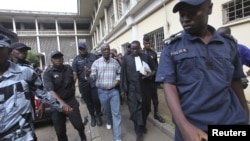DAKAR — Political tensions that brought Ivory Coast to all-out civil war in 2011 are flaring up.
Ivory Coast's military prosecutor Ange B. Kessi Kouame has charged 73 people — 19 of them soldiers — in connection with deadly raids against seven military and police installations in the past month. The attacks, carried out by unidentified gunmen, took place around the commercial capital, Abidjan, and in the country's already volatile western regions.
The government blames the violence on loyalists of former president Laurent Gbagbo, who lost a November 2010 presidential election but refused to step down, triggering a nationwide conflict that killed 3,000 people.
At least 11 people have been killed in the recent attacks.
Gbagbo’s Ivorian Popular Front (FPI), now the lead opposition party, denies any involvement in this month's violence, issuing a statement on Thursday accusing the government of human rights abuses, including harassment and extortion, in what it describes as an attempt to promote a fictitious opposition plot.
"[We] will not accept being made the scapegoats of a power struggle," said FPI's president Slyvain Miaka Ouretto in response to arrests of key party leaders in connection with recent security threats. "[We] are committed to peace and have done nothing wrong."
Officials have repeatedly accused Gbagbo's political and military allies — many of whom fled to neighboring countries in the wake of his ouster — of plotting to destabilize the government of current Ivorian President Alassane Ouattara.
According to reports by Agence France-Presse, "three key Gbagbo allies have been arrested since the recent attacks: FPI secretary general Laurent Akoun, former minister Alphonse Douati, and Gbagbo's spokesman Kone Katinan Justin."
Reuters news agency is reporting that Akoun, FPI's second in command, was sentenced to six months in prison on charges of disturbing the peace after a four-hour hearing during which the prosecution requested a jail term of five years.
Reuters news agency is reporting that Akoun, FPI's second in command, was sentenced to six months in prison on charges of disturbing the peace after a four-hour hearing during which the prosecution requested a jail term of five years.
Gbagbo is currently awaiting trial at the International Criminal Court in The Hague on charges of crimes against humanity.
Security increased
Defense Minister Paul Koffi Koffi warned this week the government will not tolerate continued subversive action that he calls an impediment to reconciliation.
"[We] do not want more conflict, and continued violence would be considered acts of terrorism, and the government will respond to them as such," he said.
Road checkpoints have returned as security around the commercial capital is ramped up, although not to levels preceding and during the previous conflict.
"On TV [they say] things are going well, but in the streets there is no reconciliation," said one Abidjan resident, a university student residing in the pro-Gbagbo Yopougon neighborhood where petty crime and intimidation by security forces remains an issue. "Armed security patrols extort money and conduct random searches."
Another Abidjan resident, who gave only his last name, Mr. Koffi, says he is struggling to feed his family and pay the rent and his children's school fees. As tensions escalate among the political elite, he explains, all residents want is calm and continued economic reconstruction.
"Ivorians need solutions, not endless arguments," said Koffi. "The regime that was in place is gone and there is a new government, [which] now needs to work on improving the daily lives of citizens."
Agence France-Presse is also reporting that Prosecutor Kessi has said a trial for the soldiers is scheduled for September 6, but that trial dates for suspects have not yet been specified.




